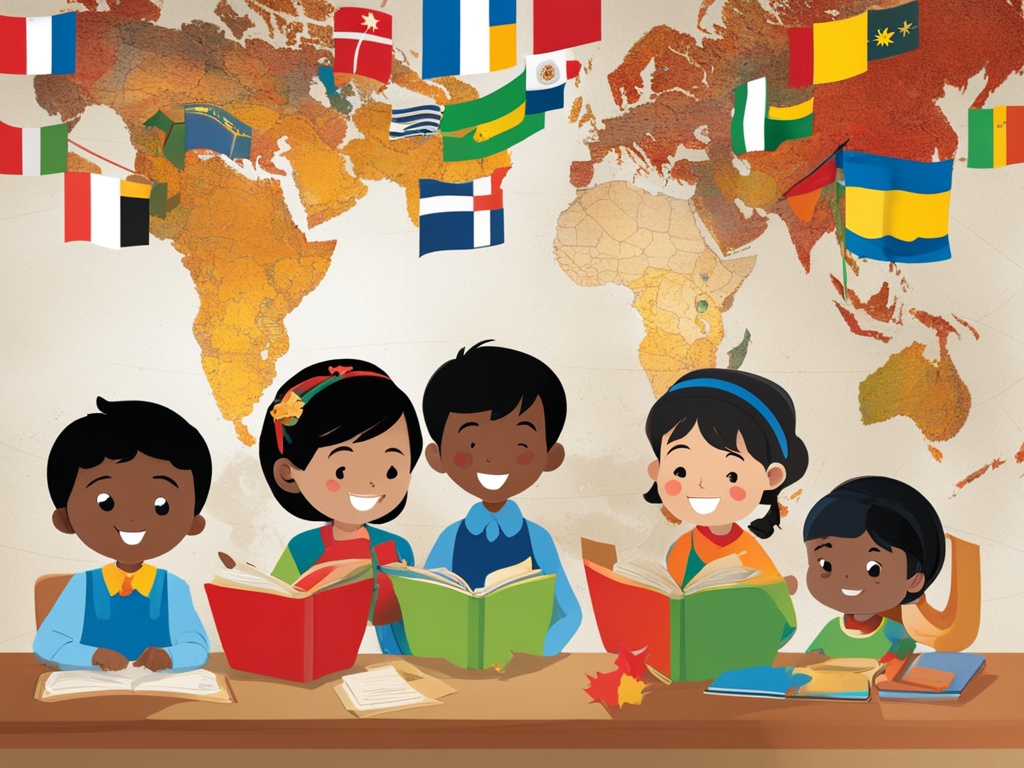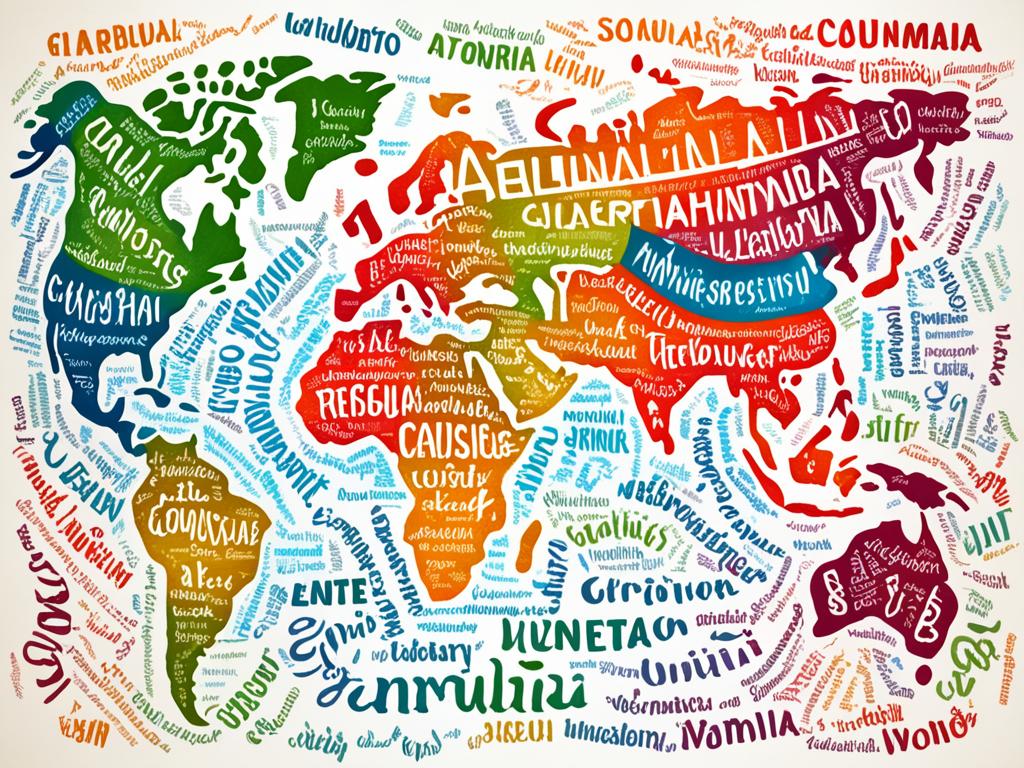
The Importance of Multilingual in Education
In today’s world, learning multiple languages is key. Multilingual opens doors for students, helping them succeed in a diverse and changing world. By learning many languages, students gain skills that help them in a global society.

At the core of multilingual education is a deep respect for all cultures. Schools that value students’ diverse backgrounds create places where everyone feels welcome. This way, students learn to understand and respect each other’s cultures.
Learning multiple languages also helps students become better communicators. It gives them the chance to connect with people from different places. This skill is valuable in school and in their future careers.
Students who learn multiple languages become more adaptable and think critically. These skills are in demand in today’s job market. They prepare students for a world where working with people from different backgrounds is common.
The impact of multilingual education goes beyond school. It prepares students for a global future. By learning languages and understanding cultures, students can work with people from around the world. This helps them build strong professional networks and make a positive impact globally.
Multilingual: Embracing Cultural Diversity
In multilingual education, embracing cultural diversity is key. By using language immersion programs, students learn about different cultures and views. This creates a welcoming place that values diversity and teaches respect.
Understanding Different Backgrounds
Students learn to value cultural differences when they’re in diverse language settings. They get better at talking across language lines, breaking down wrong ideas and building understanding. This skill helps them in our global world.
Promoting Inclusivity and Respect
Multilingual education makes students feel valued, no matter their culture or language. Teachers celebrate each student’s unique stories and views. This makes everyone feel they belong and understand each other better. It makes learning better and prepares students for our connected world.

Overall, embracing cultural diversity in multilingual education changes everything. It turns students into global citizens ready to connect with people from all over. This way of learning sets the stage for a more united and peaceful future.
Multilingual: Enhancing Language Acquisition
Multilingual education is key to boosting language skills for students. It exposes them to more languages at once. This not only makes them better in other languages but also helps their thinking skills, like critical thinking and solving problems.
Bilingual education offers more than just language skills. Language acquisition is linked to the cognitive benefits of speaking many languages. This helps students deal with different cultures more easily.
- Learning many languages helps students understand language better.
- Students in bilingual education are more flexible in their thinking, switching between tasks easily.
- Being multilingual can improve memory and focus, which helps in school.
Teachers who value language diversity make learning more exciting. This approach boosts language skills and sharpens thinking abilities. These skills are vital for doing well in a world that’s becoming more connected.

The link between learning languages and thinking skills shows why language acquisition is crucial in school. Students learn to handle a world with many languages. This prepares them for success in school and their future careers.
Fostering Global Competence
Multilingual education is key to preparing students for our global world. It teaches them to communicate and work with people from different backgrounds. This helps build cross-cultural understanding and valuable international connections.
Multilingual: Navigating Cross-Cultural Interactions
Knowing multiple languages helps students connect with others across cultures. They can understand cultural differences, feel empathy, and adjust how they talk. This skill is very important in today’s global work world.
Building International Networks
Multilingual education helps students make global connections. They can talk with people from all over the world. This opens doors to new chances in school, work, and life.

By learning multiple languages, students get ready for our connected world. They learn to work with people from different cultures and build important networks. This prepares them for the challenges and chances of today and tomorrow.
Cognitive Benefits of Multilingualism
Many studies show that being multilingual has big cognitive perks. People who speak more than one language often get better at solving problems. They’re good at seeing things from different views and switching between languages easily.
Improved Problem-Solving Skills
Switching between languages makes the brain more flexible. Multilinguals can look at problems from many sides. They think of different solutions and change their plans as needed. This skill is very useful in school, work, and life.
Enhanced Memory and Concentration
Studies also say that speaking many languages helps with memory and focus. Using many languages makes the brain stronger. It helps keep information in mind, focus better, and control thoughts. These skills help with doing well in school and growing smarter.
The importance of multilingualism in education is undeniable. It enhances cognitive abilities, improves academic performance, and fosters cultural awareness and empathy. Students who learn multiple languages navigate a globalized world more effectively, gaining a competitive edge in the job market.
Moreover, multilingual education promotes inclusivity and respect for diverse cultures, creating a more harmonious and interconnected society. As we move forward, integrating multilingual approaches in education systems worldwide is essential for cultivating well-rounded, culturally competent individuals who thrive in an increasingly interconnected world.
FAQ
What are the key benefits of multilingual education?
Multilingual education brings many benefits. It helps students understand different cultures and languages. It also boosts their problem-solving skills and memory.
How does multilingual education promote cultural diversity and inclusivity?
This type of education lets students explore various cultures. It helps them value cultural differences. Students learn to communicate across language barriers, creating a welcoming environment for everyone.
How does multilingual education enhance language acquisition?
It exposes students to more languages at once. This approach improves their language skills. It also boosts their critical thinking and problem-solving abilities.
How does multilingual education foster global competence?
It prepares students for a global world. By learning multiple languages, they can communicate with people from different backgrounds. This helps them understand and connect with others worldwide.
What are the cognitive benefits of multilingualism?
Being bilingual or multilingual has many cognitive advantages. It sharpens problem-solving skills and enhances memory. These benefits can lead to better academic performance and overall brain development.



Being Multilingual and bilingual is very good as a student and it’s has so many advantages.